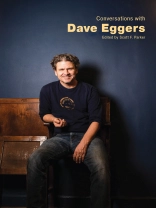It’s been barely twenty years since Dave Eggers (b. 1970) burst onto the American literary scene with the publication of his memoir,
A Heartbreaking Work of Staggering Genius. In that time, he has gone on to publish several books of fiction, a few more books of nonfiction, a dozen books for children, and many harder-to-classify works. In addition to his authorship, Eggers has established himself as an influential publisher, editor, and designer. He has also founded a publishing company, Mc Sweeney’s; two magazines,
Might and
Mc Sweeney’s Quarterly Concern; and several nonprofit organizations. This whirlwind of productivity, within publishing and beyond, gives Eggers a unique standing among American writers: jack of all trades, master of same.
The interviews contained in
Conversations with Dave Eggers suggest the range of Eggers’s pursuits—a range that is reflected in the variety of the interviews themselves. In addition to the expected interviews with major publications, Eggers engages here with obscure magazines and blogs, trade publications, international publications, student publications, and children from a mentoring program run by one of his nonprofits. To read the interviews in sequence is to witness Eggers’s rapid evolution. The cultural hysteria around Eggers’s memoir and his complicated relationship with celebrity are clear in many of the earlier interviews. From there, as the buzz around him mellows, Eggers responds in kind, allowing writing and his other endeavors to come to the fore of his conversations. Together, these interviews provide valuable insight into a driving force in contemporary American literature.
About the author
Scott F. Parker is author of Being on the Oregon Coast: An Essay on Nature, Solitude, the Creation of Value, and the Art of Human Flourishing and A Way Home: Oregon Essays as well as editor of Conversations with Joan Didion and Conversations with Ken Kesey, both published by University Press of Mississippi. He teaches writing at Montana State University.












